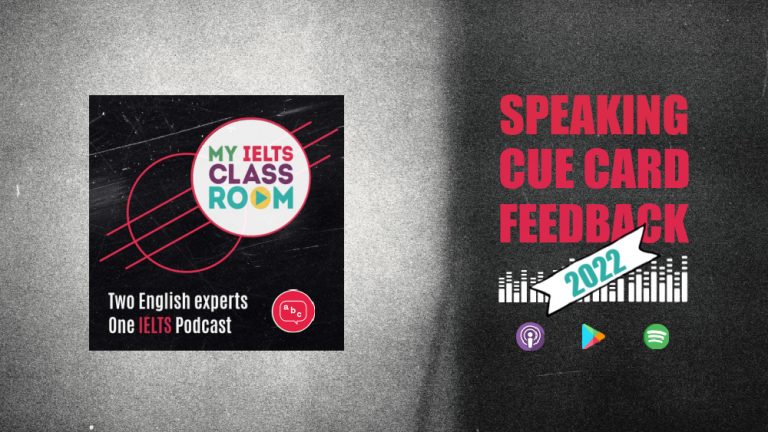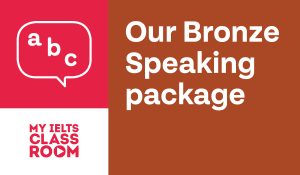
IELTS Cue Card Feedback 2022
Hey! Last week, Nick and I explained exactly how the examiner will determine your grade for Fluency and Coherence in the speaking exam. At the end of the episode, we set our listeners the challenge to record themselves attempting three current cue card questions. Today, we will be going through a selection of those recordings to give band scores and advice that will be helpful for every test-taker.
If you want to take part in the next event like this, make sure you are following our Facebook page, where we post information about the podcast and much more each week. Below, you can find a summary of the episode, which includes all of the links to useful materials and the times of each part of the discussion (so you can go directly to the part you want to listen to) 🚀
Subscribe to My IELTS Classroom podcast on Apple podcasts here
Subscribe to My IELTS Classroom on Google podcasts here

IELTS Cue Card Basics
We have a number of blog posts that will help you prepare for IELTS Speaking Part 2. You can learn the importance of adding details to your cue card performance, or how to never run out of things to say, or how to paraphrase effectively.

However, just in case there are any total IELTS beginners out there, why don’t we start by reviewing the basics of Speaking Part 2:
- How long do you have to prepare before you start to speak? 1 minute.
- Can you make notes? Yes, and we encourage this. Having short notes to help you during the two minutes can be a real help if you “run dry”.
- Can you start early if you want to? Yes, but we don’t recommend that you do this unless you are a native speaker. Use this time to think of ideas and high-level vocabulary.
- Do you have to talk about all of the bullets on the card? No, this is not necessary as there is no penalty for not covering a bullet. In my experience, students speak much more naturally when they just focus on the main topic of the cue card and speak freely.
- How will you know when your two minutes are up? The examiner will interrupt you (even if you are in the middle of a sentence!).
- Is it good if the examiner interrupts you? Yes! It means that you managed to keep speaking for 2 minutes, which is very good for your fluency and coherence score!
- What might the examiner ask you after you stop speaking? You may be asked a short question. We call this the “follow-up” question. It is always a yes/no question and, if you spoke for 2 minutes, your answer to this should be very short – just one or two sentences. If you didn’t manage to speak for 2 minutes, try to extend your answer for longer if you can to show the examiner that you are able to speak fluently.
IELTS Cue Card Feedback 2022
For the rest of the episode, Nick and I will give detailed feedback to all of the students who sent us recordings for three reported current cue cards. We will give rough band scores for each student using the public band descriptors. Why “rough”? Well your final score will be calculated based on your performance in all sections of the test, not just Part Two. Our IELTS cue card feedback will cover:
- errors using the past tense and subject / verb agreement
- Problems pronouncing specific sounds
- instances of high-level topic specific vocabulary
- why it is important not to memorise answers
- how slow speech can affect your intonation
- how reading the bullet points can make sure you speak on-topic
Would you like expert help to improve your IELTS speaking score?
We offer a 5-day intensive course for IELTS test-takers every month that covers all aspects of speaking, from how to approach each section to how to paraphrase well or address the most difficult questions in Part 3. Even better, with every course being run by an ex-examiner, you will be getting feedback is guaranteed to help you to improve your score. You can read more about the course here.

